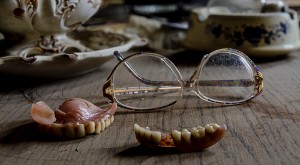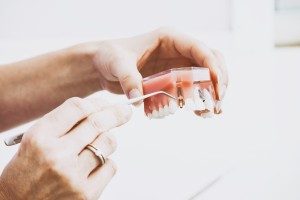Periodontal disease is an infection and inflammation that affects the tissues and bone that support your teeth. Today your denturist in Portland OR wants to share some information about this medical condition and share some warning signs to watch for.
When your gums are healthy, your gum tissues tightly hug each of your teeth. When you have gum disease, your gums pull away from your teeth. As the gum disease gets worse, the tissues and bones that support your teeth become damaged. Over time, your teeth may need to be removed.
Treating Periodontal Disease in the Early Stages is Very Important and Can Help Prevent Tooth Loss.
 Periodontal disease has been linked to other diseases. Gum disease is common among people with either diabetes or heart disease. Strokes and high stress also may be related to periodontal disease.
Periodontal disease has been linked to other diseases. Gum disease is common among people with either diabetes or heart disease. Strokes and high stress also may be related to periodontal disease.
It is important to talk to your dentist about medications you may be taking or health problems you may have. Together, you can work out an oral care plan for your best oral and overall health.
Warning Signs of Periodontal Disease
- Gums that bleed when you brush or floss
- Gums that are red, swollen, puffy or tender
- Gums that no longer tightly hug your teeth
- Feeling that your teeth are loose
- Bad breath that doesn’t go away
- A change in the way your teeth fit together when you bite
- A change in the way your partial dentures fit
You may notice one or more of these warning signs, or you may not have any signs of gum disease at all. This is why it is important to see your dentist regularly. Treatment of periodontal disease is most successful when it is caught early.
Causes of Periodontal Disease
Plaque is a sticky film that is always on your teeth. Bacteria that live in the plaque can cause your body to react and make your gums become red, puffy and swollen. Plaque can harden when it is left on your teeth and gums. Hardened plaque is also called tartar. Gums that are red, puffy, and swollen also start to pull away from your teeth. Spaces called pockets start to form between your gums and teeth. These pockets give bacteria a place to collect and grow.
The bacteria in your oral pockets will cause your gum condition to get worse. These bacteria produce toxins, which causes your body to break down the gum tissues and bone around your teeth.
Are You at Risk?
Anyone can get periodontal disease, but there are other factors that can raise your risk of getting it.
- Not taking care of your teeth and gums. Be sure you brush 2 times a day, every day, and for 2 minutes each time. Also, please remember to clean between your teeth every day.
- Using tobacco of any kind. You are more likely to have gum disease if you smoke, chew, or dip tobacco.
- Diseases that affect the whole body, such as diabetes and HIV infection lower your body’s resistance to infection, including periodontal disease.
- Many medications, such as those to treat blood pressure or steroids, can affect your gums. A common side effect is dry mouth. This can increase your risk of tooth decay and periodontal disease. Tell your dentist about all the medications you take and any changes in your health.
- Teens, pregnant women, and those taking birth control pills have changes in hormone levels. These changes can cause gums to become more sensitive to plaque bacteria.
- Genes may play a role. If your parents wear dentures or you have a family history of tooth loss, be extra alert for changes to your gums.
- The bacteria that cause gum disease may be passed from parents to children and between partners through saliva.
Treating Periodontal Disease
 Your gum disease treatment will depend on factors such as your personal health history and the stage of your periodontal disease.
Your gum disease treatment will depend on factors such as your personal health history and the stage of your periodontal disease.
All dentists are trained to detect and treat gum disease. That said, in some cases, your dentist may refer you to a periodontist – a dentist who specializes in the treatment of gum disease.
If the gum disease is caught early enough (when it is gingivitis), you may simply need a professional cleaning. Your dental team can also give you advice for improving your daily oral hygiene.
A professional cleaning is not enough if your gum disease is severe. Usually, a special deep cleaning called scaling and root planing is needed. Scaling and root planing is sometimes called “deep cleaning” or “periodontal cleaning.”
If you have any questions about periodontal disease or suspect you may be developing it, your denturist in Portland OR recommends that you see your dentist right away.
Contact us at Classic Denture Center today to find out more about dental health or for questions about dentures.












